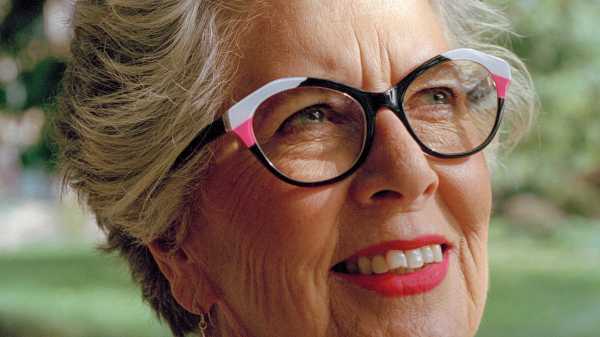
“My main problem is that I have a lot of energy and I can’t say no,” Prue Leith says. The culinary star, who is eighty-two years old, has maintained an eclectic career across the pond for something on the order of half a century. Since starting in the early nineteen-sixties as a caterer, she’s operated a Michelin-starred restaurant (Leith’s, a stalwart of the mid-century power-lunch scene), opened a cookery school, authored several cookbooks—not to mention a number of romance novels, and a dishy autobiography—and been a judge on competition programs. Born in South Africa, she became interested in food and cooking as a young woman attending school in Paris: “I was astonished to find that intelligent people took food very seriously,” she told me, in a conversation earlier this fall.
Leith is best known for her most recent gig, as a judge on “The Great British Bake Off.” The show, which began broadcasting in 2010 and became a somewhat surprising blockbuster, has been credited with reviving interest in home baking and paving the way for a gentler model of reality-competition shows. This is not to say the show is without its controversies. Despite the admirable diversity of its contestants, “Bake Off” is not always terribly good at handling global cuisines, as evidenced, most recently, by a clunker of an episode ostensibly dedicated to the food of Mexico. Still, many fans agree that the most dramatic thing ever to happen on the series was an incident, from Season 5, in which a contestant appeared to remove another’s ice cream from the freezer. In 2017, for its eighth season, the “Bake Off” moved from the BBC to the more commercially minded Channel Four; the original hosts departed, as did Mary Berry, a cookery legend who was one of the original two judges. This left her erstwhile partner, Paul Hollywood, a tanned silver fox of few words, in need of a new co-judge who could provide a foil for his deadpan, hard-to-please personality.
At the time, Leith had been appearing on a rival cooking-competition show, “Great British Menu.” In contrast to Berry’s tranquil, understated judging style, Leith occupies the “Bake Off” job as a whirlwind of brightly colored necklaces and benevolently snobbish charisma. Peering at contestants’ cakes and cookies through an ever-changing array of snazzy, oversized glasses, she seems to delight in being delighted, and is always particularly thrilled when contestants produce boozy cakes. Until criticism from eating-disorder-awareness organizations caused her to reconsider, she was prone to praising her favorite confections as “worth the calories.”
Leith told me that “Bake Off” has given her just the right amount of fame: “It’s enough to stroke my ego and make me feel good, but not enough to be a nuisance.” She also has a new cookbook, “Bliss on Toast,” and is releasing a revised version of her memoir, in which she gamely discusses, among other things, her long affair with her late first husband, Rayne Kruger. In her free time, Leith has been known to stir up trouble by voicing her support for Brexit. (Her son, Danny Kruger, is a Conservative Member of Parliament.) She spoke to me, via Zoom, from a turquoise-wallpapered office at her home in the Cotswolds, where the room’s centerpiece, a grand chandelier, was personalized with carefully balanced teacups and swags of beaded necklaces plucked from her wardrobe. When The New Yorker followed up to ask what she made of the response to the “Mexican Week” episode, she noted that the judges set the challenges and added, “There would have been absolutely no intention to offend. That’s not the spirit of the show.” Our conversation has been condensed and edited.
You’ve had a career of extraordinary duration.
I’ve done an awful lot of things, but that’s largely because I’ve lived so long. I’ve always been greedy, which I think is the long and short of it. I was born and brought up in South Africa, and I didn’t ever think of being a cook, mainly because it was under the iniquitous apartheid regime that I was born, and certain jobs were just reserved for different people. If you were a white young woman, you were not expected to go into the kitchen. Indeed, we had a wonderful Zulu cook, who had been a chef at a top Johannesburg restaurant, who cooked for us at home. I suppose he could have taught me. But it didn’t occur to me, because at the time I was mad about horses. In fact, when I was very little, I wanted to marry a horse. I’d heard of an Englishwoman who had married her dog because she didn’t like humans. So I thought, Why can’t I marry my horse? But I grew out of that.
That was probably for the best.
My father said to me, “You do realize your children will be centaurs, don’t you?”
And then eventually, in Paris, you found food.
I was a student at the Sorbonne in the nineteen-fifties. One day, I was queuing up in a student canteen, where they had self-service little dishes—you know, grated carrots in one, and beans with a few almonds on top in another. I saw this dish with just three or four radishes in it, and a little pat of butter, and a little pile of salt, and a bit of bread. I was standing behind a young man whom I didn’t know, another student, and I said to him, “That’s not food—that’s just a sort of decoration!” I couldn’t understand it. He made me buy this little plate of radishes and then he sat with me and he said, “Take the radish”—because it still had its stalk on it—“and scrape it through the butter, and then dip the buttery end into the salt, and then eat it, and then follow with the piece of bread.” It tasted so delicious. And I just thought, God, you can produce good food without ever even cooking!
I also worked for a time for a French family. Madame cooked beautifully, and she cooked everything just for the children exactly as she would for us, and they always sat down to eat. We didn’t go to one bakery to buy bread, cake, and croissants; we went to three different bakeries. From company directors to the Métro workers, everybody talked about where the best steak frites could be had, and where the raspberries were grown. I was astonished to find that intelligent people took food very seriously.
It was a culture shock to go from France to England?
I was rather horrified at how boring English food was. It was all Escoffier, but he’d been dead for decades, and nobody had moved on at all. I’d come from South Africa, where we ate mangoes and pineapple and passion fruit and had wonderful salads that had all sorts of mixed-up things in them—whereas an English salad was just cucumber, tomatoes, lettuces, and pickled beetroot, all put on a plate, no dressing. I thought they needed a shakeup, really.
Was your plan always to open a restaurant?
When I was in Paris, I had dreams of opening a tiny dive in a cellar somewhere, with a gallery of unknown painters on the wall whose works customers could buy. Something very, very cheap, with fantastically good food.
It turns out that, first of all, you can’t make any money out of a really cheap restaurant unless it’s huge: you have to have a lot of bums on seats, so you need a huge amount of capital. And, secondly, the idea of combining art and food doesn’t really work. When people are in a mood to eat, they don’t really want to look at paintings; when they want to go to a gallery, they don’t want to sit down and eat a meal. So my dream was not particularly practical, and, anyhow, I couldn’t afford it as a twenty-one-year-old. It took me till I was twenty-nine to open a restaurant, by which time I had built up a lot of customers through my catering business. I managed to persuade the bank to lend me some more money, and I’d saved a bit, and my mother coughed up about eleven thousand pounds to get my restaurant off the ground. The whole thing cost about thirty thousand pounds back then, so today it would’ve been more like three million.
The prevailing culinary fashions were very different then than they are now.
The funny thing is, I’ve just started some tryouts for a one-woman show—it is a bit odd, at eighty-two, to be on the stage in that way for the first time in my life. In the show, we play a clip of my restaurant in the nineteen-seventies. Our first courses were all served on a trolley. This was very unusual at the time, because the great Edwardian trolley, which was a big, ornate, silver-and-mahogany piece of furniture that would be wheeled around fancy restaurants, was right out of fashion. But I wanted to have a trolley, because I wanted people to have an experience like antipasti in the Italian restaurant—to have a choice of first courses that they could put together.
So there I am, in this little film, and I’m saying, “It’s really important that first courses are delicate and small, because you don’t want to spoil the main course and don’t want to overface people with too much.” And their camera pans down to this trolley of the most boring-looking food you’ve ever seen. I mean, it just looked so awful. It gets a huge laugh when the audience sees it. Here I am, going on about delicacy, and precision, and small sizes, and then the waiters are dolloping out enormous portions! It’s quite crude, really.
Why do you think you were chosen as a documentary subject?
I think I was about the only young woman in London who had a culinary business back then. I suppose it was just unusual, and I was just lucky.
You’ve been judging “Bake Off” for six years now. How did you end up with that gig?
For eleven years previously, I’d been one of three judges on a program called the “Great British Menu,” which is a competition among top chefs. When Mary Berry, who had my job at the “Bake Off” before I got it, decided not to stay with the show when it left the BBC and went to Channel Four, I thought to myself, Hmm, I’d quite like that job, but they’re not going to hire another old white lady. I thought they’d bring in some cool, young, interesting new person. But they didn’t! They went for the formula that worked: old white lady.
Did the producers approach you, or did you reach out to them?
My agent rang me up and said, “Would you like to have your hat in the ring?” I said yes, of course, but I didn’t think they’d hire me. I think it was Paul Hollywood who got me hired, actually. I had to go and do a little audition with him, where we were judging something quite simple: brownies and soda bread. He’s so confident, and he’s so knowledgeable, so he went straight in and gave the baker a crit, and I just said, “I agree. Paul’s absolutely right.” When we broke, he said to me, “That won’t do. You can’t just agree with me! You don’t have to disagree with me, but you just have to say your opinion.” I said, “But, Paul, you got it right. What’s the point of me saying it anyhow?” But he told me it was what I had to do. So then, in the second half, when we were judging the soda bread, I came charging in, elbowing him out of the way and telling everybody what I thought of the soda bread.
Had you and Paul known each other before you started filming together?
Not personally. He knew I’d had a Michelin-starred restaurant, and he’s very interested in food and chefs. And he’d watched “Great British Menu.” You know, I believe he’d made up his mind that he wanted me before I even got there, but he’s never confessed that.
Do you feel that “Bake Off” has changed throughout the years?
I think it’s got a bit snappier and faster and funnier. The most amazing thing—and Paul agrees with me about this—is that every year the bakers get better. I think that certainly was true for the past couple of years, because people have been through lockdown, so they’ve had much more time for practicing. Maybe we’ll now go backward a bit. People are busy again.
It’s always incredible to me when one of the younger contestants says that they’ve grown up watching the show—in a way, it’s gone from a series about finding undiscovered talent to finding people who have set themselves a clear goal of appearing on “Bake Off.”
That was certainly Henry [Bird, one of the youngest contestants]. I adored Henry. He always wore a tie—he was such a young fogy, and a lovely guy. Really, the whole phenomenon of “Bake Off” is, to me, absolutely extraordinary. This is rather a cliché thing to say, but I do think that it is a force for good, most of the time. Everything we do in life is a bit stressful—we are always short of time, we’re short of money, there are all sorts of horrible things happening all over the world. And “Bake Off” is this safe space where the worst thing that can happen is somebody will drop their bake. And everybody will be sympathetic! Nobody will cheer, nobody will say, “Oh, good, you’re out of the way, and now I’m going to win.” There’s none of that nastiness that you sometimes get in competitions.
You’ve now spent nearly two decades judging culinary-competition shows. How has the world of competitive-cooking TV changed in that time?
When I was offered “Great British Menu,” I hadn’t done any television for many years. I’d had a horrible director for my first experience with television, so I thought all television was awful. But, when “Great British Menu” came along, I thought, I’d like to do that because it’s my profession! I knew about restaurants, and I knew how many young, good chefs there were coming up. When I first started in the culinary trade, there weren’t any British cooks—they were all imported. In the sixties and seventies, male chefs were all French and German. The middle-class Englishman never went into the kitchen; he went into the city. Mummy and Daddy wouldn’t have let him be a cook. It was all right for girls to cook, because they could go and be posh chalet girls in Switzerland, or they could have a tea shop, or something respectable like that. The rough-and-tumble of a commercial kitchen wasn’t the thing. But, by the time of “Great British Menu,” which was started, I think, about seventeen years ago now, there were a lot of chef-patron restaurants, and young men who had opened restaurants and had trained as chefs. It was just a much more interesting group of people.
Nowadays, I feel like becoming a chef is one of the most glamorous and socially acceptable things that a person can pursue.
It’s great, in a way. It’s lovely that we are now getting young people who want to be chefs, because it’s glamorous, and because they recognize that it’s exciting, and it’s creative. It’s not like sitting in an office talking to a computer all the time. However—and I believe COVID has started to change this—there’s the hours, and the pay, and the conditions under which most chefs work. Or shall I say cooks, because, probably by the time you are a head chef, your conditions are a bit better and pay’s very much better. But it’s just ridiculous to expect young people to stay in a profession when they’re expected to work six days a week. It’s a lousy life.
How has the pandemic changed that?
Certainly in Britain, we are having to pay far more to get chefs. So many people have just stopped working, or have discovered other careers. I met a chef the other day—or, he was a really talented chef, and he’s now a long-distance lorry driver, because it’s much better pay. Just as lousy hours, but the pay is extremely better. And he doesn’t have to work six days a week—he can work four days a week.
I do think we need to force the wages up, which means, of course, the customers would [have to] be prepared to pay more for restaurant food, and they already complain that it’s tremendously expensive. But you know what? I think we’ll go on paying. I think restaurateurs should be braver, should charge more, should pay more. And the customer will pay more.
That’s a big topic of conversation with American food infrastructure—the idea that, with the ways that our government underwrites food, we’re actually in some senses paying too little for it.
Exactly. In Britain, we spend the least percentage of our income on food in the whole of Europe.
You had a rough round in the press a couple of years ago when it came out that you had voted in favor of Brexit.
Oh, I know.
And, late last year, in an interview with “Desert Island Discs,” you said that you haven’t regretted that vote. Do you still feel that way?
Well, I don’t think it’s been well handled. But I still believe that what Britain should have, and used to have, is a really entrepreneurial attitude. We’ve always been good at inventing things, exporting things, and so on. The European Union seems to have squashed that. There’s this great big bureaucracy, which, A, controls us, and, B, was our biggest market. And so, it was just too easy to not do things. I thought Brexit would really stimulate the enterprise that I think is inherent in British people. So no, I don’t regret it. But I do think what’s happened is partly to do with COVID, and then the universal economy problems. It’s been really hard. And I think the Brexit lot—well, obviously Boris [Johnson] didn’t help himself with his own behavior, but he did have a really rough ride from the world economy, and Brexit, and so forth. So I don’t think Brexit’s had a real chance yet. And I still believe in it. Certainly if we do anything half right in the next ten years, we’ll do a better job than we did as part of the European Union.
I don’t know if you read the U.S. press about “The Great British Bake Off,” but not long ago the Web site Vulture referred to the show, with its remarkably diverse contestant-casting, as effectively “an anti-Brexit metaphor”—in the sense of, Look at what extraordinary things can happen when we bring all of these people together.
That’s very odd that they should think that’s anti-Brexit, because not everyone is from Europe. A lot of the contestants are from Africa, from Asia, from the Middle East. I mean, I’m all for foreigners, don’t get me wrong. I think that painting Brexiteers as little Englanders who only want to have white conservatives do everything—that end of the Tory Party is just dreadful, and I’m not in favor of that. Anyhow, we must get off all this politics, or I’ll get crucified again.
You mentioned your one-woman show. Do you focus mostly on food and your public career, or do you go into your personal life?
It’s mostly my career and food, but I do talk about geriatric love, which people love, especially since I imagine a lot of my audience will be older women. It’s a bit about family—I adopted a Cambodian daughter, which always interests people. And, of course, inevitably, I’m asked about my long affair with Rayne before I married him.
A thirteen-year affair with a married man is awfully compelling.
People are naturally interested in that, but they’re also very understanding. It’s only the press who go on about sex, drugs, and rock and roll, which my life has not been. But you can’t live eighty-two years without ever having gone to a party.
You’re also now publishing your eighth cookbook, about putting delicious things on toast. How did that come about?
I live a very busy life—my husband complains quite often that our house is a cake-free zone, and he should have married Mary Berry, but I do always cook everything savory from scratch. I’d never buy a ready meal or open a can of beans and call that supper. Our suppers, when we’re alone together, tend to be very simple, and I would cook something during the week—we’d maybe have people over, or I’d just make a nice lunch or something—and I’d end up with leftovers, and I’m so mean, and so Scottish, that I never throw anything away. I realized that a lot of the suppers we had would be something leftover, on toast, and they would be rather interesting and good. I slowly realized that, actually, anything that tastes good on a plate tastes even better on toast. Obviously, the toast has got to be good. It’s got to be really good bread. It adds another layer of flavor. It adds crunch. It adds a really interesting texture. If I’ve got leftover coq au vin, for example, or even leftover shepherd’s pie—almost anything goes well on toast.
There’s something existentially quite different between putting things on toast, and putting them between two slices of bread.
A sandwich has always been thought of as a snack food, something that you eat in the street almost. And something on toast requires a knife and fork, and that just elevates it a bit. But, to be honest, there were a couple of recipes, only about three, where I could not resist putting stuff between two pieces of bread. Those recipes maybe couldn’t really be called “Bliss on Toast” but, rather, “Bliss in Toast.” For example, there’s a mozzarella en carozza kind of thing, which is a fried-cheese sandwich.
At this point in your career, do you still find food romantic, or is it just work?
I still find it exciting—yes, I do. And surprising! For example, I’m normally very prejudiced about restaurants with long tasting menus. Very smart restaurants that cost a fortune and put you through sixteen tiny mouthfuls, every one accompanied by a waiter who gives you a lecture on where the burrata came from, and these were Buckfast bees who made the honey—really, just the provenance of every ingredient. And you are out with your lover, or your boyfriend, or your husband, or your best friend, because you want to see them, not because you want to listen to a lecture on food. So I usually avoid restaurants with long tasting menus. But, a couple of weeks ago, my husband and I went to dinner at a new restaurant in our local village. The chef was a friend of mine, and it was a tasting menu. And you know what? It was absolute heaven, because every course was original and different, and nobody talked to you at all. ♦
Sourse: newyorker.com






